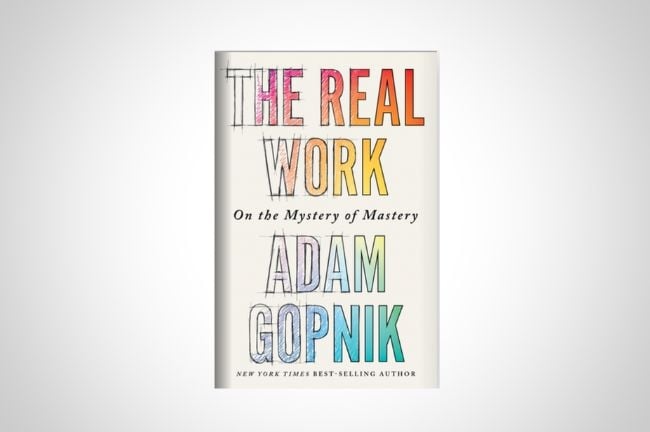You have /5 articles left.
Sign up for a free account or log in.

W. W. Norton
The Real Work: On the Mystery of Mastery by Adam Gopnik
Published in March 2023
Adam Gopnik’s parents were professors at McGill. His four siblings all have Ph.D.s. Gopnik never finished his dissertation in art history. In getting to that stage of graduate school, he figured out that he did not want to follow his parents into academia.
Perhaps if the alternative-academic track had been visible to Gopnik, he would have been motivated to complete his thesis. My only evidence for this conjecture is that Gopnik’s latest book, The Real Work, will be of great interest to the learning tribe of the alt-ac community.
Gopnik, perhaps, didn’t think he was writing a book for a traditional academic audience. He might be unaware that a growing population of nontraditional academics is curious about the intersection of organizational change and student learning. (Traditional academics who focus on learning, such as cognitive scientists, will also enjoy The Real Work, but for different reasons.)
These nontraditional academics, scholar-practitioners whom Eddie Maloney and I explore in our book Learning Innovation and the Future of Higher Education, spend their days figuring out how university structures can better align with the science of learning.
The Real Work is about how learning is translated into effective and meaningful practice. Through stories of his efforts to learn new things (driving, drawing, baking, boxing, dancing and others) and through describing what expertise looks like (in chapters on magicians and magic), Gopnik develops a set of ideas about learning. These ideas on learning explored in The Real Work can be transplanted to higher education and the goal of evolving our organizations to better support our learners.
The world of magic and magicians explored in The Real Work provides some insights into universities and learning. For magicians, achieving expertise is not in learning to perform a trick. Developing the technical skills to pull off illusions is only the very start of the journey of a professional magician. The real work of magic comes in developing the ability to perform illusions with an audience and then have that audience respond in ways that make them, and others want to pay money to see the show.
Learning to be a magician is different than learning to perform magic. In the same way, learning to thrive in a profession differs from learning to perform the discrete skills that professionals in the field must master. The real work of the expert is everything that happens around the skills.
For champions of a liberal arts education, the observation that skills do not equate to career-necessary expertise is not surprising. The argument for a liberal arts education has always been that foundational abilities in communication, collaboration and critical thinking are the keys that best unlock the long-term value of specialized skills.
Again, and to be clear, the project of redesigning our universities to support student learning is the furthest thing that Gopnik had in mind when writing The Real Work. Perhaps readers hailing from other professions, from stock brokers to police officers, will also conclude that The Real Work is helpful in thinking about their occupations. That is one mark of a good book—we find it useful in our lives.
Certainly Gopnik, a longtime writer for The New Yorker, is at the top of the nonfiction essay game. I suspect that he could write about almost any subject (and he writes about many), and the reader will find value in the pages.
For academics, the value of The Real Work may be in asking ourselves about the real work of the university. How might we design our institutions to provide all learners with skills and the context to translate those skills into expertise? What is missing when we focus on only skill development? But at the same time, what do our students miss out on when their academic experience is devoid of learning the hands-on abilities that constitute expertise in every domain of work?
The Real Work is not about universities. It is a book that tells stories about how the author learns to do some new things and how that process alters his relationship with the world. (The chapter on learning to drive as an adult stands out for its humor and insights.)
Sometimes, a book that has nothing to do with universities helps us to think about how to think about our work within the university.
What are you reading?








